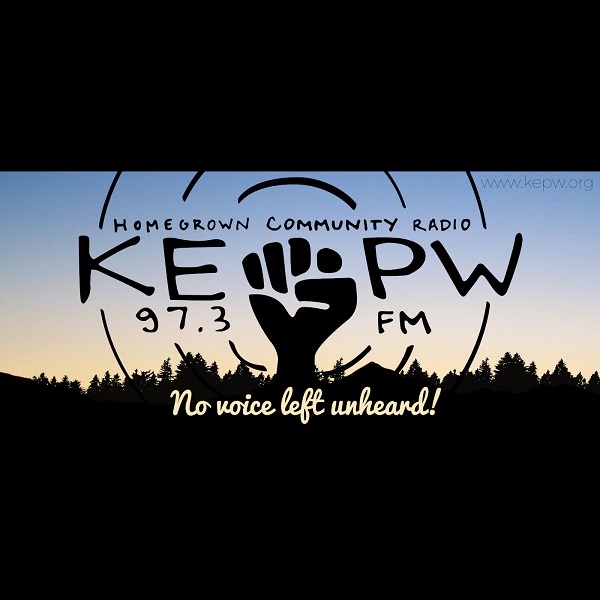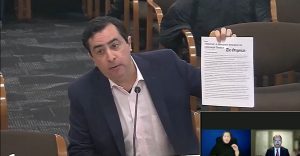Residents speak out against 4 a.m. noise pollution
7 min read
by Joshua Kielas
For the last couple years residents of some North Eugene neighborhoods have been awakened at 4 a.m. by droning sounds produced by a company called Zip-O-Laminators that travel through walls, earplugs, and white noise machines alike.
People have taken to online forums such as Nextdoor, written letters to the editor, spoken with neighborhood leaders and city councilors, and still the noise continues.
In January 2022, the River Road Community Organization hosted a discussion on the topic in a meeting that drew almost 200 people. They heard from both community members and the city, but representatives of Zip-O-Laminators did not make an appearance.
This article is a summary of that forum, and includes a recording of the noise that is being heard from the factory.
Editorial note: the author lives in River Road and experiences the noise pollution firsthand.
This article is shared under the Creative Commons No Commercial No Derivatives license; the licensor cannot revoke these freedoms as long as you follow the license terms.
At the River Road Community Organization Jan. 10, 2022, co-chair Clare Strawn introduces Dharmika.
[00:00:05] Clare Strawn (RRCO Co-chair): Okay. Dharmika, do you want to talk about this?
[00:00:08] Dharmika Henshel: Zip-O-Laminators. They’re on First and Seneca at the old Pennington Crossarm building and they have a planer that sticks out the north side of the building. And it makes this low-frequency incessant sound that seems to travel north up the railroad tracks and gets you guys all the way up—I’m about a half a mile away, with some of you guys, like three, four miles up.
[00:00:32] It’s been waking some of us up for over a year and a half.
[00:00:36] They’ve been doing a lamination project for the Portland Airport and they apparently had to take on another company’s work that couldn’t finish it.
[00:00:45] The noise ordinance does not cover this kind of sound, and that’s a problem. Because they measure the sound, they cut out the low frequency sounds with dB(A) readings, and so this sound that kind of goes through walls and vibrates us that only some people are sensitive to, is not accounted for in the noise ordinance.
[00:01:06] So even if or when hopefully this problem is over, I think the noise ordinances are a problem ‘cause they don’t take into this account. And some of us have been woken up for years, two years now by this.
[00:01:18] Clare Strawn: Thanks, Dharmika. I just want to fill in a little bit more information: The issue is the ordinances deal with sound, not vibrations. They hear our complaints and don’t want to be bad neighbors, and they’re working on figuring it out.
[00:01:34] We invited Lydia Bishop from the city to come to a meeting and she’s here now.
[00:01:38] Lydia Bishop: Hi there, everyone. My name is Lydia Bishop. I’m the building and permit services director at the city. Code compliance is one of the sections that’s in that part of the building department.
[00:01:49] So as many of you know—and I think I’ve had some email correspondence with some of you—when we first received complaints, we went out and did readings based on what the code allows us to do. And they have not been in violation of the noise ordinance in terms of the amount of dB(A) and they also don’t have any operating hours that apply to them.
[00:02:12] Commercial, industrial don’t have limitations on operating hours such as construction activity, for instance. So usually when we find out that there’s not a case, we close it down. But in this case, we knew that this was really disturbing to the neighborhood.
[00:02:27] The compliance supervisor, Ken Green, spent quite a bit of time talking with Jason. In April of last year, they constructed some noise mitigation measures. I understand they may not be completely addressing people’s issues, but they did go ahead and do that. And the conversations that I’ve had with Jason, he said the same things, that they don’t want to be a bad neighbor, that they do want to address the issue to the extent that they can.
[00:02:54] And he, in my last conversation with him, he said that he was going to be speaking with, his bosses the owners of Zip-O-Laminator. We have reached out to them and they did voluntarily do something to address, some of the noise issues that were being created.
[00:03:10] Just make one closing comment. honestly, the way really to deal with this is, through a code amendment; that code amendment could address operating hours, maybe some different types of sounds, though we haven’t seen that approach taken anywhere in Oregon, but I think that is the most expeditious way to address the issue.
[00:03:29] John Q: Facilitating the discussion, RRCO co-chair Clare Strawn.
[00:03:33] Clare Strawn: Okay. Laura.
[00:03:34] Laura: Well, first I, I appreciate what Zip-O-Laminator has done. It’s certainly better than nothing. I would say if they wanted to be really good neighbors, why didn’t they work on getting that planer put inside as soon as they realized that it was waking people up at four in the morning or disturbing our mornings.
[00:03:54] Why are we waiting until 2022 for that? and given that he, they’re saying now that they do have other jobs using this planer. Is the planer really going to move at the end of this job, Which by the way, is, I guess it’s building the beams for the ceiling in the new, um, airport, uh, terminal. So if you see photos of that online, it’s really beautiful.
[00:04:17] But I want to see more from them as far as the city and the city council. When I contacted Claire Syrett back in March, she dug into it more with Lydia and everybody else, and I appreciated her interest. She did say that she was interested in doing the work to possibly update the codes so that it would take into account vibrations.
[00:04:46] I emailed her at the end of December to see, you know, whether that had started and what would be good touch points for us to kind of be assured that that work is in progress. And she said that she’s going to do that work or wants to do that work, but it hasn’t started.
[00:05:04] So I’m wondering, you know, how can we put some constructive pressure, you know, not just on Claire Syrett, but on the city council in general to get these ordinances changed so that Zip-o-Laminator can’t continue to affect the community and so that other businesses also are not able to.
[00:05:26] Clare Strawn: Okay. Thank you, Laura. Jack.
[00:05:28] Jack: Hi. I am not familiar with the ordinances, so I’m coming at this pretty naive except for the fact that we’re on Sunny Drive and, you know, what happened to disturbing the peace? I mean, you put that on top of what we’re dealing with the trains. Not just the noise, but it seems like it’s one thing after another with the trains and now this, and like, we’re over all the way over on Sunny and the house feels like it’s vibrating on its foundation.
[00:06:01] I’m sure a lot of other people are here for the same reason, and I might be speaking for some others. Thank you.
[00:06:07] Clare Strawn: Thanks. Jennifer.
[00:06:08] Jennifer: Yes. What I find most egregious is that it starts at four in the morning. Four in the morning, so that means every morning at 4:00 a.m., I wake up.
[00:06:20] Secondly, you can put earplugs in and it doesn’t help a bit. That stuff cuts right through, and so I just don’t see how this can be something that is legally acceptable. Can’t they at least push it back till eight in the morning, which is at least a time of day when more people naturally wake up.
[00:06:41] If the city can’t do something about this, I don’t know what, I don’t understand why nothing can be done about this, because unless they’re made to stop, I don’t think they will.
[00:06:51] Clare Strawn: I see ‘M Shubert.’
[00:06:53] M Shubert: Hi. I hear this vibrating noise from 4:00 ‘til 8:00-8:30 in the morning.
[00:07:02] Sometimes I’m home trying to work. It’s very hard to focus and I can’t help but feeling that this is a bit of an equity issue because we’re a more modest-income neighborhood. I feel like if this were in South Eugene, they would not tolerate it for five minutes. An action would happen.
[00:07:21] I confess, I don’t get the paper every day. I just get on the weekends, but I haven’t seen any public discussion of this. And it’s just that frustration of being on this end of town and that it’s almost like, I don’t know how to put it: ‘We asked for it because we moved here.’
[00:07:41] You know, I’ve lived here 30 years. Yeah. I’ve grown accustomed to the trains. I can deal with that, but the vibrating is a different thing and I think the city really needs to move more quickly. It’s very frustrating that they’re using these archaic rules that don’t apply to the situation.
[00:07:59] Jeremy: This is Jeremy. This has been a terrible, terrible situation. We’ve lived here since 2007. It’s created insomnia for me and it’s definitely an equity issue and because my neighbors are all people that are working-class and renters and homeowners, everybody’s just trying to get by during a pandemic.
[00:08:19] This is terrible and it makes me embarrassed to live in Eugene when we can’t just take care of the people around us who just want to get a good night’s rest during a pandemic and go to work and feel rested.
[00:08:29] John Q: RRCO sent a letter to the city council on behalf of the community.
This article is shared under the Creative Commons No Commercial No Derivatives license; the licensor cannot revoke these freedoms as long as you follow the license terms.






